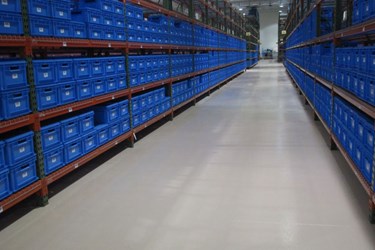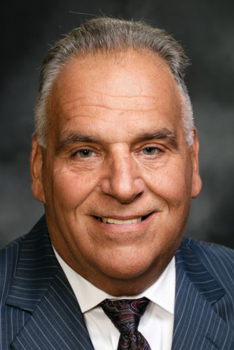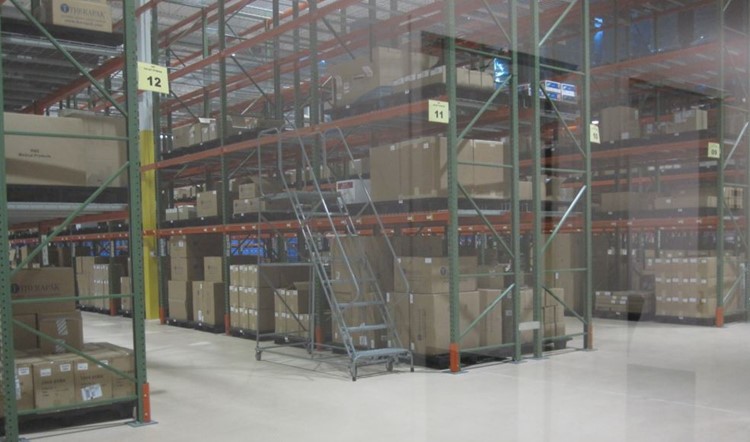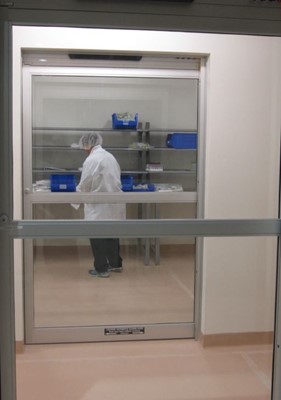New Coordination Hub And Distribution Center Serves Pharma's Clinical Supply Needs

By Ed Miseta, Chief Editor, Clinical Leader

In clinical trials, many functions have to operate smoothly and efficiently for an approval to be granted. With all of the attention being paid to patients, data, innovation, and new technologies, one aspect that can get overlooked is the packaging, labeling, and distribution of clinical supplies. No trial can take place unless sites – and ultimately patients – receive their required clinical supplies. An intricate system of logistics has always been required to make that happen. But for many of the new investigational medical products (IMPs) making it into today’s trials, protecting the shipments and keeping them at the right temperature has never been more important.
Logistics is as complicated a process in pharma as it is in any other industry. But the requirements of many of today’s biologics make the process even more difficult. Today, many IMPs require strict temperature control, especially in the areas of oncology and large molecule research. “To achieve these temperature requirements, supplies must be packaged, stored, and transported in appropriate conditions, typically around two to eight degrees Celsius,” says Sanjay Vyas, corporate vice president, global head of clinical trial supplies & logistics for PAREXEL. “We also need to make use of tools such as temperature monitoring devices, temperature controlled shipping containers, and for proper security, track and trace technology. The industry increasingly needs to have these cold chain capabilities in place.”
 |
 |
 |
| Sanjay Vyas, corporate vice president, global head of clinical trial supplies & logistics for PAREXEL | Matthew Caponi, senior director, North America depot & production services for PAREXEL | Vince Santa Maria, vice president, clinical trial supplies & logistics for PAREXEL |
The tsunami of biologics that has hit the pharmaceutical industry and will grow during the next five years is having a significant impact on clinical trials. As these products need to reach more patients and sites, significant expertise and infrastructure will be required to get them there safely and efficiently. “Many of these biologics are molecules that will be injected into human beings for the very first time,” adds Vyas. “This is a patient safety issue that everyone from the sponsor company down to the clinical site takes very seriously. For the safety of patients, it may be mandatory for medicines to be kept at a constant temperature throughout the entire journey from the manufacturer to the end user. The quality and safety of those medicines, which can have values in the millions of dollars, is something that must be addressed at every step in the supply chain.”
PAREXEL has spent years helping sponsor companies manage and optimize their clinical supply chain needs. That logistical support started 10 years ago, but was ramped up significantly four years ago when the company expanded its clinical supply capabilities to manage the logistics of the drug discovery function in a manner that Vyas describes as “concept to grave.” When a molecule is produced and ready for a clinical trial, it can enter the PAREXEL tracking system, where it remains under strict control until it is ultimately administered to the patient or returned to a distribution facility for proper disposal.
In an effort to further expand its supply chain capabilities, PAREXEL opened a new, state-of-the-art coordination hub and distribution center in Quakertown, Pennsylvania, just 50 miles away from the international airport, rail, and port facilities of Philadelphia. According to Vyas, the new North American Coordination Hub and Distribution Center represents a major commitment to clients and the biopharmaceutical R&D clinical trial supply chain. It will join coordinating hubs the company already has in place in Berlin and Singapore.
The facility will be part of PAREXEL’s global depot network of facilities that package, label, store, and distribute IMPs, clinical trials supplies, ancillary supplies, and equipment for clinical trials worldwide. Featuring sophisticated capabilities, including enhanced packaging and labeling services, expiry date management, and returns and destruction, the center will serve small regional studies and complex global trials and has the capability to be scaled for entire development programs.
Packaging, labeling, and distribution will be executed according to PAREXEL’s standard operating procedures, which are designed to accelerate project setup, decrease turnaround times and minimize supply chain issues. “The North American Coordination Hub and Distribution Center significantly expands our capacity to provide the clinical trial supply and distribution services to support sponsors’ local, regional, and global trial requirements,” says Vyas. “It features more than 60,000 square feet of space for packaging, labeling, storage, and distribution of IMP/NIMP and ancillary supplies.”

The services provided by the hub are many. The facility is a cGxP clinical storage facility with DEA standards and multiple temperature zones ranging from controlled room temperature (15 to 25 degrees Celsius) to cold (two to eight degrees Celsius) to frozen (minus 15 to 30 degrees Celsius). Capabilities offered also include secondary packaging and labeling as well as global storage and distribution, controlled substances, and lab kit production.
The facility also offers the ability to consolidate all clinical trials supplies, as well as ancillary and lab supplies, into a “study in a box.” Designed to simplify logistics and help reduce the risk of misplaced materials and improve inventory control, study in a box can also significantly reduce shipping costs.
The cold storage area of the facility boasts an impressive 165,000 cubic feet of space and includes a state-of-the-art cold store production room and distribution preparation area. Matthew Caponi, senior director, North America depot & production services for PAREXEL, notes this will allow for the elimination of any temperature excursion while packing or preparing shipments for distribution. “Clients who have minimal stability information for their investigational products benefit greatly from this elimination in time out of refrigeration,” he says. “The facility also supports the latest in innovative approaches to blinding investigational and commercial comparator products. We are able to support the blinding of traditional delivery methods such as prefilled syringes and vials, an array of newer devices such as metered dose inhalers, dry powder inhalers, and auto-injectors, as well as other novel devices being developed for use in clinical trials.”
Having the right staff to run the facility is a critical component. The facility’s close proximity to Philadelphia allows PAREXEL to draw on the talents of that labor pool and those in surrounding areas. Extensive training programs are mandatory for facility staff and cGxP experience is required. All employees have five to 10 years of industry experience, with many having as much as 10 to 20 years of experience.
Vyas notes the goal of the facility is to act not only as a regional distribution center, but to also provide the flexibility to manage and serve small regional studies to complex global trials by aligning with PAREXEL’s global depot network and infrastructure. Small and mid-sized CROs without a distribution hub of their own are also welcome clients. The module approach of the PAREXEL distribution centers enables the company to tailor a solution to any organization in the life science industry.
Every clinical trial is unique, and Vince Santa Maria, vice president, clinical trial supplies & logistics for PAREXEL, notes this was taken into account in the design of the facility. “To meet the unique characteristics of each clinical trial, this new center will offer flexibility, scalability, and a customized approach to the sourcing, manufacturing and distribution strategy for customers’ trial supplies and distribution requirements,” he says. “The North American Coordination Hub and Distribution Center will handle various types of studies, ranging from a simple regional one to the highly complex study requirements we see today. It is also robust and compliant with all the regional, FDA, and clinical regulations that are required to efficiently manage the clinical logistics in a global trade compliant manner.”
The facility’s location near Philadelphia provides it with easy access to the pharma and bio hubs on the East Coast. It also enables efficiencies through PAREXEL’s end-to-end and customized clinical trial supply services, designed to reduce study startup times and accelerate first patient-in.
“It’s no secret that the healthcare industry is under increased pressure to reduce costs,” states Santa Maria. “Our North American Coordination Hub and Distribution Center allows sponsor companies to employ a smaller number of suppliers, decreasing the cost of vendor management. Additionally, it enables sponsors to outsource external yet important components, such as managing logistics, thereby allowing them to focus on the core of the study.”
 The center will also support PAREXEL’s hub and spoke strategy, which allows it to join coordinating hubs the company already has in place in Berlin, Germany and Singapore, while supporting spokes in Sao Paulo, Brazil, Santiago, Chile, Buenos Aires, Argentina, Tokyo, Japan, and St. Petersburg, Russia, as well as other worldwide regions. The distribution network contains more than 50 owned or in-network depots.
The center will also support PAREXEL’s hub and spoke strategy, which allows it to join coordinating hubs the company already has in place in Berlin, Germany and Singapore, while supporting spokes in Sao Paulo, Brazil, Santiago, Chile, Buenos Aires, Argentina, Tokyo, Japan, and St. Petersburg, Russia, as well as other worldwide regions. The distribution network contains more than 50 owned or in-network depots.
“The hub will not only strengthen our global packaging, labeling, and distribution model, but also support depots in individual countries,” says Vyas. “This will allow us a bigger and broader global access, especially to the growing and emerging clinical markets in Asia and Latin America. As clinical development is truly global in nature, effective trial supply chain management requires a supplier that can consider the site of bulk drug manufacture and then employ an extensive network of well-positioned clinical packaging and distribution sites based on the strategy. The new North American Coordination Hub and Distribution Center allows for PAREXEL to effectively complete a global network and offer clients a single provider answer.”
PAREXEL’s entire global depot network is integrated with PAREXEL Informatics – the company’s technology arm that provides solutions to facilitate the clinical development process – providing sponsors with the ability to seamlessly connect and employ study data, patient activity and the clinical supply chain. PAREXEL’s Clinical Trials Supplies systems ensure the right products are in the right place at the right time. PAREXEL’s ClinPhone Randomization and Trial Supply Management (RTSM) software provides transparency across the clinical supply chain and seamlessly manages trial supplies by automating the restocking process for clinical sites and depots. It can also help users manage adaptive trial designs by allowing for rapid study design changes.
Vyas adds the technology and in-house expertise will ensure the integrity and quality of pharmaceutical and biologic products. “We have heard from sponsors regarding the need for supply chain management with track and trace capabilities. The system and the facility we currently have in place cater to this need and is supported by a robust, internal global trade compliance group that will ensure client products can be delivered safely and on-time to any location in the world.”
In addition to the cold chain capabilities, the center features enhanced security features, vaults controlled via dual access, a barcode tracking system with multiple safeguards, and a generator covering all critical utilities in the facility that undergoes extensive monthly tests.
The North American Coordination Hub and Distribution Center opened for business in late March, following a six-month construction period.
